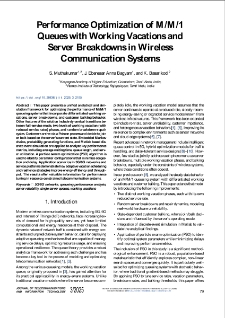Instytut Łączności – Państwowy Instytut Badawczy contains 2 324 digital objects
Object
Title: Performance Optimization of M/M/1 Queues with Working Vacations and Server Breakdowns in Wireless Communication Systems, Journal of Telecommunications and Information Technology, 2025, nr 3
Group publication title:
Description:
Abstrakt:
Number:
Publisher:
National Institute of Telecommunications
Resource Identifier:
DOI:
eISSN:
Source:
Journal of Telecommunications and Information Technology
Language:
Rights Management:
Biblioteka Naukowa Instytutu Łączności
License:
Object collections:
- Digital Library > Institute's Publications > Current Publications > Journal of Telecommunications and Information Technology (JTIT)
Last modified:
Oct 2, 2025
In our library since:
Oct 2, 2025
Number of object content hits:
73
All available object's versions:
https://bc.itl.waw.pl/publication/2725
Show description in RDF format:
Show description in OAI-PMH format:
×

